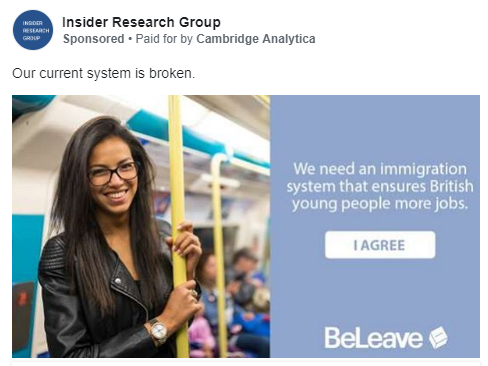
Facebook approved fake political adverts “paid for” by the scandal-hit firm Cambridge Analytica that were actually created by journalists.
The blunder comes just weeks after the social media giant released a new political advertising transparency tool in the UK which requires users to verify their identity and location.
But the new process failed to pick up two fake political adverts created by Business Insider, which listed them as “paid for” by Cambridge Analytica – the firm that was banned from the platform after harvesting the data of 50m Facebook users without the platform’s permission.
The data collected by the firm was then allegedly used to direct political advertising at voters during the Brexit and US presidential votes of 2016.
Business Insider explained that it had to go through a driver’s license and UK address verification process before it was able to post ads.
The business news website then set up a Facebook page for a fake NGO, named “Insider Research Group”, which ran the fake political adverts.
Both adverts were targeted at a local east London audience and only taken down after two days when Facebook realised they were fakes.
Business Insider used adverts that were previously run by the Brexit referendum campaigns Vote Leave and Beleave.
A Facebook spokesperson said: “This ad was not created by Cambridge Analytica. It is fake, violates our policies and has been taken down.
“We believe people on Facebook should know who is behind the political ads they’re seeing which is why we are creating the Ads Library so that you can see who is accountable for any political ad.
“We have tools for anyone to report suspicious activity such as this.”
Facebook has since marked the Insider Research Group adverts as “disapproved” on its new advertising archive, which allows information on ad buyers to be viewed for seven years.
One of the ads (pictured) made between 1,000 to 5,000 impressions – how often an ad appears on-screen for a target audience – according to Facebook’s ad archive listing, seen by Press Gazette.
In a blog post about the launch of its new ad transparency tools earlier this month, the company said: “While we are pleased with the progress we have seen in the countries where we have rolled out the tools, we understand that they will not prevent abuse entirely.
“We’re up against smart and well-funded adversaries who change their tactics as we spot abuse. But we believe that this higher level of transparency is good for democracy and is good for the electoral process.”
Enforcement of the new transparency tools is set to begin on 7 November.
Vice News reported last week that a “small test” by its team of the new ad transparency feature found it to be “easily subject to manipulation”.
Picture: Business Insider/Facebook ad archive
Email pged@pressgazette.co.uk to point out mistakes, provide story tips or send in a letter for publication on our "Letters Page" blog
